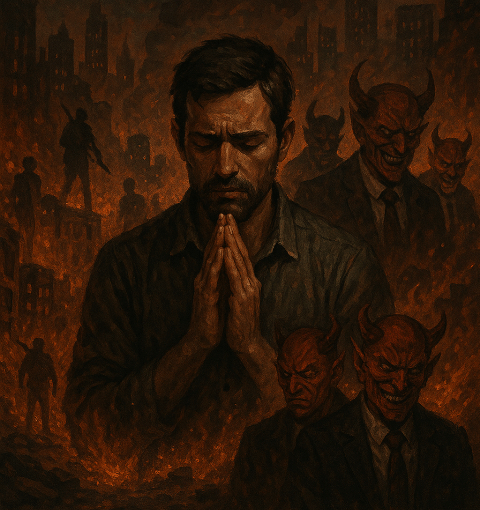Between Heaven and Evil: Reexamining the Foundations of a Corrupt Society
Imagine being told that the world as we know it is one of pervasive wickedness. Would you be startled? Let’s unpack this idea and examine the forces that shape our daily lives.
The Western Blueprint: The Legacy of the East India Company
In today’s world, many of our societal structures trace their origins to systems devised by Western powers. One significant example is the enduring influence of the East India Company—a symbol of colonial ambition and exploitation. Although centuries have passed since its formation, the business practices and power dynamics it established continue to influence economic and social systems today. Many modern institutions, regulations, and even cultural attitudes are built upon this complex legacy.
Winners and Losers in a System of Corruption
Under this inherited system, life has become a contest of survival. For most individuals, everyday challenges seem insurmountable; pressures mount as they strive to make a living within parameters that favor calculation over integrity. A striking phenomenon emerges: those who reject traditional moral codes, who even oppose the teachings and values of Christ, often find themselves rewarded by the system. Individuals engaged in deceit, smuggling, or even organized crime seem to gain wealth, power, and luxury with alarming rapidity.
On the other hand, honest people—those who adhere to ethical living and hard work—face relentless struggles. Many work tirelessly and sometimes sacrifice their lives to uphold their values, only to see their efforts undermined by a system that rewards corruption over virtue. This staggering disparity raises uncomfortable questions about fairness and the true measure of success in our modern society.
The Quest for Divinity in a Decaying World
In an era when moral confusion prevails, even our sacred ideas have been upended. Ask yourself: What is god? What is heaven? These aren’t questions born solely of philosophical pursuit—they’re desperate reflections of our collective conviction that the world around us is anything not heavenly. When people strain to worship a higher power, it often signals a longing to escape a reality that feels profoundly corrupt. In essence, many are driven to seek divine intervention because they believe that the world they inhabit is, in its current state, a manifestation of evil.
This belief system creates a paradox. For centuries, people have strived to make the world a better place by holding on to ancient spiritual ideals. Yet, the very structures that govern our lives have transformed our surroundings into a battleground between light and darkness. The confusion over the nature of god and heaven is not simply academic; it is a mirror reflecting the chaos in our material existence.
The Irony of Modern Existence
The modern world is steeped in irony. The very system that promises progress, abundance, and enlightenment instead amplifies the stark contrast between truth and deceit. While a few enjoy a lifestyle built on cunning and immorality, the majority of people are left grappling with hardship and despair. This discrepancy forces us to question: Is our current order a product of inherent wickedness, or is it a deliberate design that benefits those unburdened by moral conscience?
In many ways, it appears as though the pursuit of wealth and power has overshadowed principles of fairness and decency. Ethical individuals are constantly sidelined in a race steered by those who, by all moral standards, have chosen the easier—and oftentimes, more corrupt—path. With every instance of deceit rewarded, the gap between the have and the have-not widens, driving many to believe that the world is structured not for the common welfare, but for the enrichment of the few.
Searching for Redemption Amidst Chaos
In the midst of this dark tableau, the longing for redemption burns brighter. People continue to seek solace in the hope of something greater—something that transcends the material decay of modern life. Many still turn to religion and spirituality, hoping to find reassurance in the promise of heaven. They pray not only because they have faith in a divine plan, but because they yearn to escape a world that feels irreparably tainted by greed and corruption.
Yet, this quest also forces us to confront a deeper dilemma: If our current system discredits traditional paths to divinity, must we redefine what it means to live a righteous life? Can we aspire to reclaim the virtues of old in an age where wickedness often proves more profitable than honesty? These questions remind us that the search for meaning is both personal and collective—a call to reexamine our values and the legacies we choose to uphold.
Conclusion
The narrative of our times is one of contradictions—the legacy of a system born from Western colonial ambitions coexists with the timeless human longing for justice, truth, and redemption. In a world where corruption seems to thrive and ethical living is met with undue hardship, our understanding of divinity and even the concept of heaven is put to the test.
By acknowledging the roots of our modern system and questioning the paths it has paved, we open the door to reimagining a society that honors virtue and compassion. Ultimately, this is not just a reflection on the wickedness of our current world, but a call to action to rebuild a future where integrity and honesty are truly rewarded—a future where the promise of heaven is not merely an escape from an evil world, but a destination achieved through the collective pursuit of goodness.

